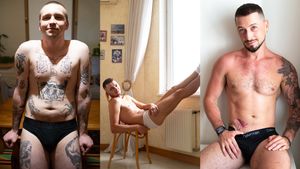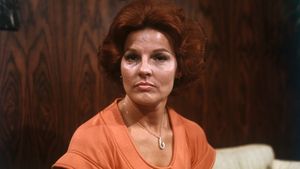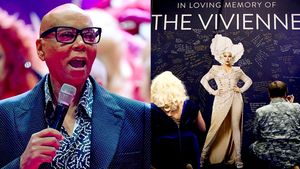
Treatment GuideJust DiagnosedSex & DatingAfrican AmericanStigmaAsk the HIV DocPrEP En EspañolNewsVoicesPrint IssueVideoOut 100
CONTACTCAREER OPPORTUNITIESADVERTISE WITH USPRIVACY POLICYPRIVACY PREFERENCESTERMS OF USELEGAL NOTICE
© 2025 Pride Publishing Inc.
All Rights reserved
All Rights reserved
By continuing to use our site, you agree to our Private Policy and Terms of Use.
In the upcoming HBO movie Life Support, Queen Latifah takes on a role based on a real-life HIV survivor who is described as a mother, a former addict, and an AIDS activist. Set in and filmed around Brooklyn, N.Y., director and cowriter Nelson George's story was inspired by the struggles of his family--especially his sister, Andrea Williams--and the way HIV affects their lives. But the story brings out emotions that go beyond just the virus--in the ways that you see it touching the life of almost every character, especially when it seems there isn't a spare moment in their lives that they can't escape it. As Jamie Foxx, one of the film's executive producers, points out: 'Unlike most films on HIV, it is not about dying from the virus but living with it and how the past continues to live with you. The film is overtly a story about living with HIV, but it is also about the struggle to forgive.' It's easy to see what he means as the movie begins. Latifah's Ana is at an HIV-positive women's support group. The stories that each participant shares--touching on themes of drug addiction, their men's time in prison, trust, negotiating safer sex--all set the tone for the struggles that each person, especially Ana and her family and their friends, have to deal with. When the director met Latifah he says he knew she was the perfect choice to play his sister as well as to represent all the women with HIV he'd met as he followed his sister around on her outreach work. 'Latifah embodies the spirit these women have,' he says. 'I think this is one of the first roles she's had that has allowed her to project the totality of her being. She embodies a certain strength and dignity in her work, and it seemed like it was a natural fit.' There could be good reason for that fit. Latifah says the movie hit home for her: 'I could relate to the story. I spent a lot of time in Brooklyn during my teenage years. I was very fortunate to come through that time period healthy and to change my life and get back on course. I can relate to Ana in that respect.' But the feelings of both personal evolution and, ultimately, some sadness, of course, come from the realization that the film is based on real life--people we all live with or know--and watching the characters' lives intertwine, watching how they learn that they need to rely on each other to survive and be happy. 'As I began doing more and more research for the film,' George explains, 'I realized that this story was far larger than my own family and the film I started out to make. All of the amazing women I met at these support groups--this is their story. They are part of the group that accounts for 51% of new diagnoses, and some of the locations where we shot have some of the highest rates of infection in the country. I wanted to give a voice and a face to people who appear to be just statistics--but are far more than that.'
From our Sponsors
Most Popular
Why activist Raif Derrazi thinks his HIV diagnosis is a gift
September 17 2024 12:00 PM
How fitness coach Tyriek Taylor reclaims his power from HIV with self-commitment
September 19 2024 12:00 PM
Out100 Honoree Tony Valenzuela thanks queer and trans communities for support in his HIV journey
September 18 2024 12:00 PM
Creator and host Karl Schmid fights HIV stigma with knowledge
September 12 2024 12:03 PM
The freedom of disclosure: David Anzuelo's journey through HIV, art, and advocacy
August 02 2024 12:21 PM
From ‘The Real World’ to real life: How Danny Roberts thrives with HIV
July 31 2024 5:23 PM
Eureka is taking a break from competing on 'Drag Race' following 'CVTW' elimination
August 20 2024 12:21 PM
California confirms first case of even more deadly mpox strain
November 18 2024 3:02 PM
Plus: Featured Video
Latest Stories
A camp for HIV-positive kids is for sale. Here's why its founder is celebrating
January 02 2025 12:21 PM
This long-term HIV survivor says testosterone therapy helped save his life.
December 16 2024 8:00 PM
'RuPaul's Drag Race' star Trinity K Bonet quietly comes out trans
December 15 2024 6:27 PM
Ricky Martin delivers showstopping performance for 2024 World AIDS Day
December 05 2024 12:08 PM
AIDS Memorial Quilt displayed at White House for the first time
December 02 2024 1:21 PM
Decades of progress, uniting to fight HIV/AIDS
December 01 2024 12:30 PM
Hollywood must do better on HIV representation
December 01 2024 9:00 AM
Climate change is disrupting access to HIV treatment
November 25 2024 11:05 AM
Post-election blues? Some advice from mental health experts
November 08 2024 12:36 PM
Check out our 2024 year-end issue!
October 28 2024 2:08 PM
Meet our Health Hero of the Year, Armonté Butler
October 21 2024 12:53 PM
AIDS/LifeCycle is ending after more than 30 years
October 17 2024 12:40 PM
Twice-yearly injectable lenacapavir, an HIV-prevention drug, reduces risk by 96%
October 15 2024 5:03 PM
Kentucky bans conversion therapy for youth as Gov. Andy Beshear signs 'monumental' order
September 18 2024 11:13 AM
Study finds use of puberty blockers safe and reversible, countering anti-trans accusations
September 11 2024 1:11 PM
Latinx health tips / Consejos de salud para latinos (in English & en espanol)
September 10 2024 4:29 PM
The Trevor Project receives $5M grant to support LGBTQ+ youth mental health in rural Midwest (exclusive)
September 03 2024 9:30 AM
Introducing 'Health PLUS Wellness': The Latinx Issue!
August 30 2024 3:06 PM
La ciencia detrás de U=U ha estado liberando a las personas con VIH durante años
August 23 2024 2:48 PM
Trending stories
Recommended Stories for You















































































